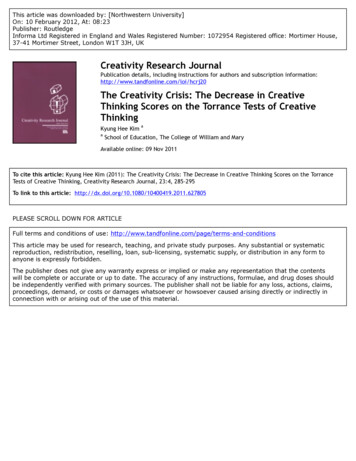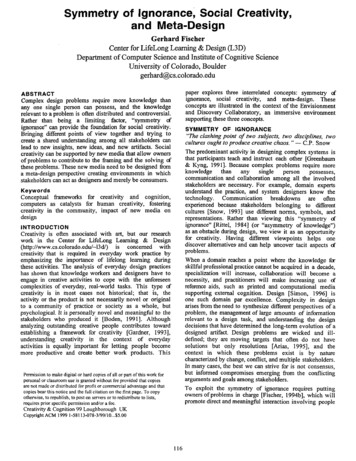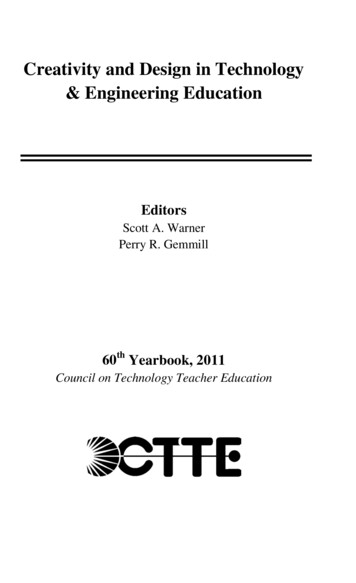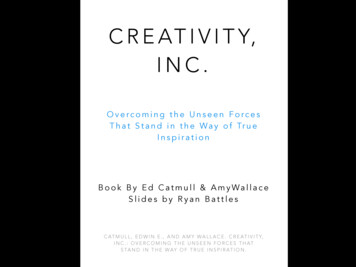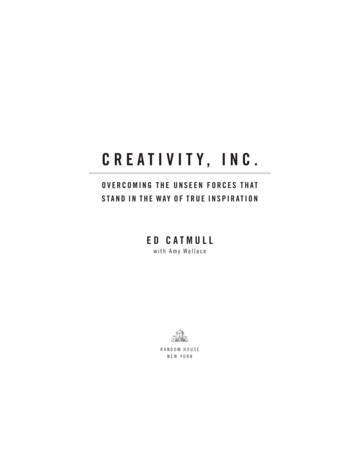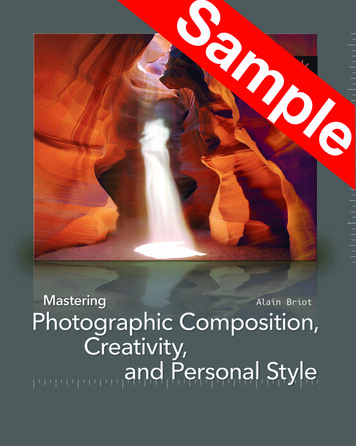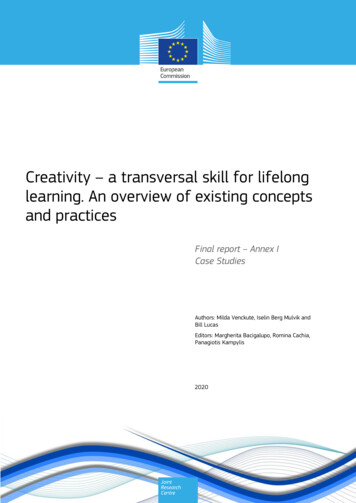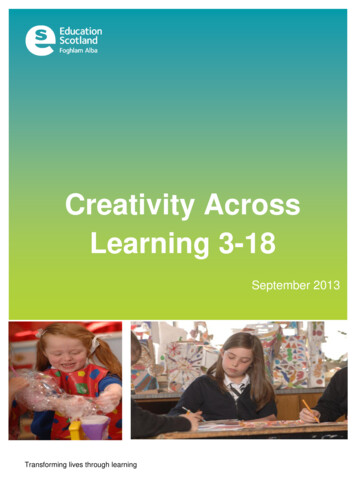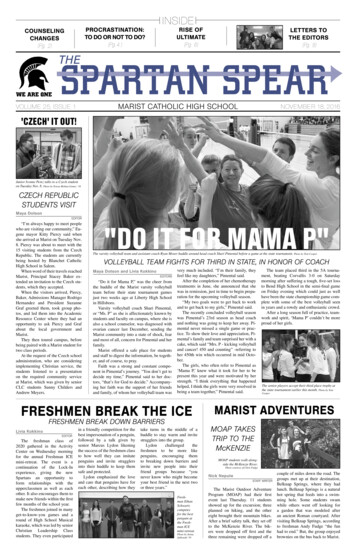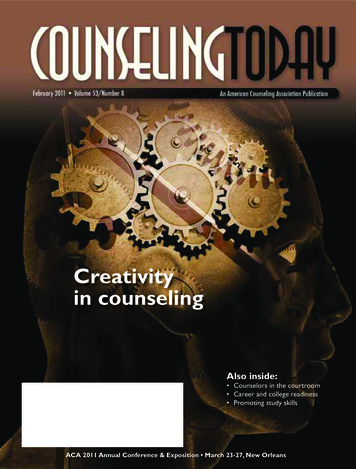
Transcription
Creativityin counselingAlso inside: Counselors in the courtroom Career and college readiness Promoting study skillsACA 2011 Annual Conference & Exposition March 23-27, New Orleans
From ASPirAtion to reAlitynnArgosy University, College of Psychology and Behavioral Sciencegraduate degrees are designed for individuals who wish to further theirprofessional development in the fields of mental health, counseling andcommunity services.The Master of Arts in Community Counseling Program prepares younto become a skilled and caring counselor able to work with diverseindividuals and groupsnto serve in various community and mental health settingsThe Doctor of Education in Counselor Education and Supervision facilitates yournbecoming a counselor educator who trains and supervises newgenerations of counselorsactualizing your vision of becoming a leader in and gatekeeper of the fieldArgosy University, aspire to be.Argosy University Administration205 North Michigan Avenue, Suite 1300 Chicago, IL 60601ApApReInitialCare about othersAre eager to promote changeStrive for professional andpersonal achievementnAd #: PDeadlinFirst RuPublicaSectionSpecs: For individuals who:nProof Dcounseling.argosy.edu1.877.851.9072Degree programs, delivery options, and start dates vary by campus. Argosy University, Washington DC is certified by the State Council of Higher Education to operate in Virginia. Argosy University, Nashville isauthorized by the Tennessee Higher Education Commission. Financial Aid is available to those who qualify. Argosy University is accredited by the Higher Learning Commission and a member of the North CentralAssociation (230 S. LaSalle Street, Suite 7-500, Chicago, IL 60604-1413, 1.800.621.7440, www.ncahlc.org). The Doctor of Psychology in Clinical Psychology Program at Argosy University, Atlanta, Chicago, Hawai’i ,Orange County, Phoenix, Schaumburg, Tampa, Twin Cities and Washington DC is accredited by the Commission on Accreditation of the American Psychological Association (APA) (750 First Street, NE, Washington D.C. 200024242, 1.202.336.5979). The Doctor of Psychology in Clinical Psychology Program at Argosy University, San Francisco Bay Area is “accredited, on probation (appealable)” status with the Commission on Accreditation of theAmerican Psychological Association (APA) (750 First Street, N.E., Washington, D.C. 20002-4242, 1.202.336.5979).
CounselingTodayCover Story26Working outside the boxBy Lynne ShallcrossContentsFebruary 2011When it comes to infusing creativity into counseling sessions, an open mind and awillingness to try are much more important for practitioners than any perceived levelof artistic expertise.Features32A Musical Chronology and the Emerging Life SongBy Thelma Duffey & Shane HaberstrohAkin to a musical scrapbook, this creative intervention uses meaningful music tohelp clients connect with feelings, thoughts and memories, while giving perspectiveto relevant life experiences.36Your witnessBy Stacy Notaras Murphy2632The courtroom is an intimidating environment for many counselors, but a growingnumber of practitioners are finding fulfillment by serving as expert and lay witnesses.42OpinionEnsuring college access for all:A call to the school counseling professionBy Cheryl Holcomb-McCoy, Vivian Lee, Julia Bryan & Anita YoungTo safeguard the future viability of school counselors, it is time to advocatefor a stronger school counselor identity that includes claiming college and careerreadiness as a dominant knowledge and skill domain.45Reader ViewpointPopping some sizzle into study skillsBy Debra Madaris Efird36To boost their presence in the academic arenas of their schools, counselors mightconsider offering sessions to students on motivation, time management, memorizationand test taking.February 2011 Counseling Today 3
CounselingTodayFebruary 2011101216182224Washington UpdateCounselor Career StoriesPrivate Practice in CounselingResource ReviewsThe Digital PsywayACA BlogsBeing a baby boomerFrom the PresidentOn the first day of 2011, the oldest baby boomers beganturning 65. Each day for the next 19 years, 10,000 moreboomers will reach that milestone. In an effort to gauge babyboomers’ outlook on life and other issues, the Pew ResearchCenter polled 1,500 people in December. The study found amixture of gloom and good health, contemporary ideals andtraditional beliefs. Here are some of the findings:Executive Director’s MessageuNeed to Know5785154565758NumbersNumbersby theColumnsACA Foundation MessageCACREP PerspectiveDivision, Region & Branch NewsuuBulletin BoardNews & NotesClassifiedsuuu4 Counseling Today February 201180 percent of baby boomers say they are dissatisfied withthe way things are going in the country today, comparedwith 60 percent of those ages 18 to 29.21 percent of boomers say their standard of living is lowerthan that of their parents at the same age; just 14 percentof non-boomers feel the same.61 percent of baby boomers feel younger than their actualage, compared with about half of American adults ingeneral.70 percent of baby boomers, as well as young adultMillennials, say the main purpose of marriage is mutualhappiness and fulfillment rather than raising children.66 percent of baby boomers say divorce is preferableto staying in an unhappy marriage; only 54 percent ofyounger adults said the same.43 percent of baby boomers report being a “strong”member of their religion, which is a higher rate thanyounger adults (38 percent of Generation Xers and 37percent of Millennials) but lower than adults born between1928 and 1945 (50 percent).
Marcheta EvansFrom The PresidentCounselingTodaywith young clients in detention facilities,I remember exploring different ways ofconnecting with them. Although I wasgrounded in traditional counseling theoriesand techniques, modifications were neededto connect with these clients effectively. Thatwas my creative moment.Although some counseling professionalsseek specific credentialing in the creative arts,others simply access their inborn creativityand use it within their scope of training ascounselors, remaining mindful of the ethicsand parameters of their practice. As ACCattests, creativity, when used within the scopeof a counselor’s professional competency,can provide innovative opportunities foreveryone involved.During the winter break, I helped myoldest daughter, a teacher, move into her newsecond-grade classroom. Looking aroundthe school, I noticed all the wonderfulcolors and beautiful new learning centers.I thought about how we are taught as kidsto be creative, taught that it is OK to takea book and sit on the floor or color outsidethe lines. My smile started to fade, however,as I reflected on our progression throughacademic training. As we got older, we hadto stay more within the lines, and therewere no longer any bright colors presentin the classroom. Being a teacher and anadministrator myself, I realize the importanceof having rules and order, but do we losesomething really valuable in this process? Canwe keep both the color and the order? Canwe have structured creativity? This seems likean oxymoron.I recently read an article by JeffreyBaumgartner titled “10 Steps for BoostingCreativity.” The steps included listeningto music, brainstorming, carrying a smallnotebook and a pen/pencil to record ideasand, if you are stuck looking for an idea,opening a dictionary. Other tips: definingyour problem, going for a walk or engagingin gentle exercise, not watching TV, notdoing drugs, reading as much as you can and,finally, exercising your brain.Reflecting again on the concept ofcreativity in our professional lives, I believethis is a skill we all must possess to beeffective counselors. I hope you do as well.I wish everyone a Happy Valentine’s Day! uClaiming your creativityAre you creative? That’s thequestion I want you to consideras you read my column. Thismonth’s Counseling Today cover storyfocuses on creativity in counseling, whichcaused me to reflect on my personal journeyof incorporating creativity into my workand getting comfortable with the notionthat I am creative. You see, I was never oneof those kids in class who could color orpaint very well. In fact, I can barely drawa stick person. Sure, I love music and allforms of dancing, but creative was not oneof the words I would have used to describemyself or what I did in my counselingpractice. That is, until I met ThelmaDuffey, professor of counselor educationand department chair at the University ofTexas at San Antonio and founder of theAssociation for Creativity in Counseling.ACC is a fairly new division within theAmerican Counseling Association thatfocuses on creative, diverse and relationalapproaches to the work of professionalcounseling. Thelma and I engaged in heartyconversations regarding the word creativityand discussed how counselors are oftenresourceful and creative in ways we maynot even realize. After listening to her andexploring various definitions of creativity,I walked away feeling more enlightenedand better about what I was doing as apractitioner. It caused me to realize that Iam creative.Creativity involves the ability totranscend traditional ideas, rules, patternsand relationships to create meaningfulnew ideas, methods and interpretations.Creativity involves originality,progressiveness and imagination. I believeI demonstrate these qualities in all areasof my work. Reflecting on my workCounseling Today StaffPublisherRichard YepAssociate PublisherCarol NeimanEditor-in-ChiefJonathan Rollins800.347.6647 ext. 339jrollins@counseling.orgSenior WriterLynne Shallcross800.347.6647 ext. 320lshallcross@counseling.orgAdvertising RepresentativeKathy Maguire607.662.4451kmaguire@counseling.orgGraphic DesignerCarlos J. Soto II800.347.6647 ext. 377csoto@counseling.orgCT Column EditorsWashington UpdateScott Barstow800.347.6647 ext. 234sbarstow@counseling.orgCounselor Career StoriesRebecca Daniel-Burke800.347.6647 ext. 230RDanielBurke@counseling.orgResource ReviewsKelly DuncanKelly.Duncan@usd.eduPrivate Practice in CounselingRobert J. Walsh and Norman C. Dasenbrookwalshgasp@aol.comSpotlight on JournalsSheri Baumansherib@u.arizona.eduNew PerspectivesDonjanea L. Fletcherdfletche@westga.eduThe Digital PsywayMarty Jenciusmjencius@kent.eduFebruary 2011 Counseling Today 5
Help Your Clients Work Learning Into LifeThe CenTer for Professional DeveloPmenT aT exCelsior CollegeHere is a great piece of advice that can make a tangible difference in someone’s future:The Center for Professional Development at Excelsior College, offering the education andskills needed to advance in a current job or start a new career. And like the degree programs atExcelsior College, the Center’s non-credit programs are designed to provide a first-rate onlinelearning experience for adult students.At the Center, there are over 120 non-credit programs in today’s fastest growing career fields:business administration, health care, project management, investigative science, sustainableenergy, computer technology, and much more. No waiting for a semester to begin; every courseis available when the student is ready — no matter where in the world that student might be.Our Campus is Wherever You Are —Virtually Everywhere.www.excelsior.edu/cPd6 Counseling Today February 2011
Richard YepExecutive Director's messageNCounselors comingtogether to faceprofession’s challengesext month, thousands ofprofessional counselors andgraduate students will cometogether in New Orleans for the ACAAnnual Conference & Exposition. Theregistrations we have received indicate thatwe will be welcoming professionals fromall over the country and from many partsof the world. Those who have visited NewOrleans previously know a truly uniquecity is waiting to greet them, and those whohave never been to the Big Easy well,all I can say is buckle your seat belt and beprepared for quite a ride! New Orleans hasa vibrancy that extends beyond the greatestjazz and the most amazing restaurants.It is a city with a true soul, a spirit thatcontinues to rise up and face adversity —not unlike the counseling profession.Many of you attending the ACAConference will be involved in our community-wide Day of Giving Back project,which will encompass providing servicesin many different venues throughout NewOrleans, as well as learning about community advocacy strategies that participantswill be able to take back to their own cities.I hope you are able to join us in NewOrleans — and not just because we are trying to meet some financial commitment forthe association. Rather, I want you there towitness the services and networking beingbrought about by the changing demographics we see in the ACA membership. Wehave an increasing number of graduate students relative to professional members. Wehave a number of midcareer counselors whoare seeking new career paths. We also have a“graying” group of members who have seenthe best of times (and perhaps the worst oftimes) in regard to the opportunities andchallenges the counseling profession hasfaced over the past 60 years.Clearly, we will have an incredible mixof professionals and students, and we hopethat the Annual Conference will help tomeet the needs of each unique constituency.In January, I attended the annual conference of the American Association of StateCounseling Boards. As the organizationkicked off its 25th year of service (whichwill be observed at AASCB’s 2012 eventin Charleston, S.C.), we heard from TedRemley, the conference’s keynote speakerand AASCB’s first president. Ted made anumber of interesting points as he lookedback at AASCB’s history, but he also inspired the group to meet the challenges thatit will face in the coming years.Ted noted that he and his contemporariesmade up the first generation of licensedcounselors. Many of you in Ted’s generation recall when there was no such thingas counselor licensure and what you wentthrough to achieve passage of that legislation. Ted asked the audience to rememberthat we have licensure today because counselors stepped up, faced the challenge anddid something that he believes truly keptthe profession alive.Ted observed that if the profession wasgoing to survive, it needed to work togetherrather than fragmenting into specialties thatwent off to do their own thing. Similar tohow AASCB supported licensure effortsthroughout the United States during thepast 25 years, Ted encouraged the group tobegin working on creating and supportingminimum standards for reciprocity andportability.In New Orleans at the ACA Conference,I hope that attendees will take the time toembrace their diversity of thought, whilealso coming together with ideas that support a unified profession. As Ted said thispast month, if the profession is going tomake it, we have to work together.As always, I hope you will contact mewith any comments, questions, or suggestions that you might have. Please contactme via e-mail at ryep@counseling.org or byphone at 800.347.6647 ext. 231.Thanks and be well. uCounselingTodayAmerican CounselingAssociationPresidentMarcheta Evans800.347.6647 ext. 232marcheta.evans@utsa.eduPresident-ElectDon W. Locke800.347.6647locke@mc.eduExecutive DirectorRichard Yep800.347.6647 ext. 231ryep@counseling.orgCounseling Today (ISSN 1078-8719) is themonthly magazine of the American CounselingAssociation, 5999 Stevenson Ave., Alexandria,VA 22304-3300; Telephone: 703.823.9800;Internet: counseling.org. Opinions expressedin this magazine do not necessarily representopinions of the editors or policies of theAmerican Counseling Association.Subscriptions are available for 150 for 12issues by calling PP&F at 800.633.4931. Singlecopies are available for 12.50 each by callingACA in-house fulfillment at 800.422.2648 ext.222.Periodicals postage paid at Alexandria, Va., andadditional mailing offices. Postmaster: Sendaddress changes to ACA Member Services,5999 Stevenson Ave., Alexandria, VA 22304.All rights reserved, 2011 by the AmericanCounseling Association.Editorial PoliciesCounseling Today reviews unsolicited articlesand guest editorials for possible publication.Not all articles will be accepted for publication.Send articles or request a copy of the writingguidelines by e-mailing ct@counseling.org.Anti-Discrimination PolicyThere shall be no discrimination against anyindividual on the basis of ethnic group, race,religion, gender, sexual orientation, age and/ordisability.Mission StatementThe mission of the American CounselingAssociation is to enhance the quality of lifein society by promoting the developmentof professional counselors, advancing thecounseling profession and using the professionand practice of counseling to promote respectfor human dignity and diversity.February 2011 Counseling Today 7
ACA Foundation Message -By Howard B. SmithIs your altruism myopic?By virtue of the fact that you arereading this particular articlein this particular publication,it is reasonably safe to assume that youare either a member or a friend of theAmerican Counseling Association. Assuch, you have often heard the analogythat ACA is like a family. The membersand friends of ACA share many commonbeliefs about and are committed tohelping people in need. This is one of theanswers most often given when graduatestudents are asked why they have chosenthe counseling profession or when thosewith many years of practice are askedwhat drew them to and kept them in theprofession. They want to help people.They are altruists in the best sense ofthe word.According to the American HeritageCollege Dictionary, fourth edition, thedefinition of altruism is an “unselfishconcern for the welfare of others,selflessness” or “instinctive cooperativebehavior that is detrimental to theindividual but contributes to the survivalof the species.”As with most things that are basicallygood, however, there are sometimesholes or blind spots in our definition orcomprehension of altruism. For many ofus, one such hole, blind spot or anomalyis that when we think of altruism, westop at the first part of the definition.We look only outside of the ACA familyin our concern for the welfare of others.We see the homeless, the individualsexperiencing emotional, interpersonal,intrapersonal or developmental pain, butwe often overlook members of our family.Further, we do this to such a degree thatit is detrimental “to the individual” (inthis case, the counseling profession itself ).The ACA Foundation is committedto seeing to it that those who are inneed survive. We also recognize thatto make certain that happens, the8 Counseling Today February 2011profession itself, and the practitionerswithin the profession, must survive.Stated somewhat differently, the ACAFoundation believes we can do more as afamily or group than we can accomplishas a bunch of individuals.Whether it is assisting graduatestudents through scholarships, makingcertain that counselors who workwith children in need have readingresources through our Growing Happyand Confident Kids program, helpingcolleagues who have experienced adisaster get back into practice throughour Counselors Care Fund or givingspecial recognition to those individualswho have done an exemplary job withinthe profession, the ACA Foundationnurtures members of the counselingprofession. In turn, this helps them tohelp others.Being a family, the ACA Foundationdepends on ACA members and friendsto contribute to these programs in orderto sustain them. It serves as a repositoryfor the contributions from members overtime so we can assist members when theneed arises. If we had 45,000 memberswho each contributed 5 per year, wewould have slightly less than one-quarterof a million dollars each and every yearto sustain our profession through theprograms mentioned previously.That is less than two cups of Starbuckscoffee per member. How about it?Would you be willing to do your parttoward that end? There is a spot onyour ACA membership renewal form toindicate your contribution to the ACAFoundation. Please give it your seriousconsider
Argosy University is accredited by the Higher Learning Commission and a member of the North Central Association (230 S. LaSalle Street, Suite 7-500, Chicago, IL 60604-1413, 1.800.621.7440, www.ncahlc.org). The Doctor of Psychology in Clinical Psychology Program at
